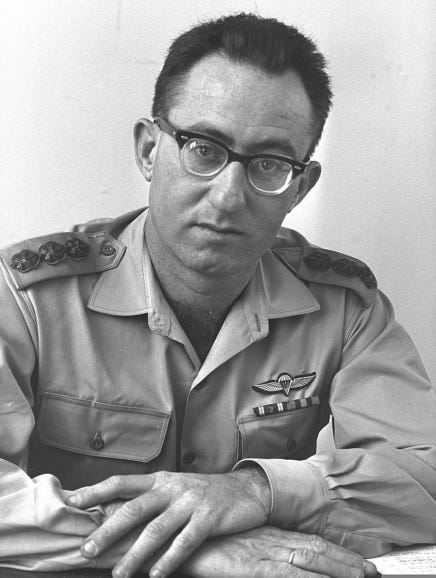'Defeat the Palestinians, then set them free'
Revealed: the private warning of the Israeli general who feared that occupying the West Bank and Gaza would lead to disaster
General Elad Peled would have been appalled by Israel’s actions in Gaza and the West Bank. He had fought in its war of independence in 1948. Fifty-eight years ago this week, he commanded the army’s 36th Division in the West Bank in the Six Day war. He left the army in 1968 but was recalled five years later to serve in Israel’s reserves in the Yom Kippur war.
I met him briefly shortly before his death four years ago. He was clear about how his country has lost its way since 1967. Thanks to a document unearthed by his daughter, Yael, we can now show that he did not simply change his mind in old age as problems mounted in the region. All along he was a general with a conscience.
I did not know of Elad’s existence until I sat next to him at a seder – a feast at Passover – for my extended family when I was visiting my Israeli cousins. It was the first family seder that I, a half Jew who has always lived in Britain, had ever attended. Elad was a distant relation by marriage. Then aged 90, he talked about how things had gone badly wrong. There was no anger in his voice; his tone was one of deep regret.
He had been close to Yitzak Rabin. In the West, Rabin is now mainly remembered as the Prime Minister in the 1990s who negotiated a peace agreement with Yasser Arafat, the Palestinian leader – and was subsequently assassinated by a right-wing extremist who opposed the agreement. In Israel he equally remembered as the Israeli army’s Chief of staff of who led the invasion of the West Bank and achieved complete victory in just six days.
Elad told me that he and Rabin believed that the purpose of the war was to demilitarise the West Bank and then return it to Palestinian civilian control. Together they planned the invasion with this in mind. “We said: ‘We assume that the aim is to disarm the Palestinians and then hand the West Bank back to them’. We did not envisage a lengthy occupation. Had we carried out the plan in full, perhaps we would not be in the trouble we are in today.”
I was fascinated by what Eled told me. Recently, as the plight of Gaza has worsened and violence on the West Bank increased, his words seemed to grow in significance. I started to delve into his story.
I found that Elad was no soft-hearted compromiser. In the 1950s and 1960s, he feared that the politicians running Israel, were insufficiently robust in standing up for their new country.
In 2002 he told the BBC’s Jeremy Bowen of a meeting just before the start of the Six Day war at which senior government ministers confronted generals such as Rabin and Elad from the younger generation: Elad said: “The mental generation gap was very important. We were the cowboys, frontier people. We looked at the older generation as people who were not free, they were not liberated… the minister of education asked me 'what if you're wrong? You're playing with the existence of the state.' I told him I am 100% confident about the result of the war.”
Peled died in 2021 at the age of 93. I recently got in touch with Yael. She doubts that the plan for the six day war existed in the form that Elad told me. Maybe one day the files of IDF, the Israel Defence Force, will be opened up. Nevertheless, there is no doubt that Elad and Rabin had a firm view of the purpose of the war.
This is part of Yael’s eulogy to her father; my thanks to her for allowing me to put it into the public domain.
“When we found, in one of the boxes, a document on “The Jordanian Problem”* that he had submitted in 1966 to the Chief of Staff (Rabin), the Head of Operations, and the Head of Military Intelligence, we were all moved. The document doesn’t just examine military aspects, but also economic, social, and above all—moral dimensions.
“The analysis references Jewish history and the histories of other occupying and occupied nations, like France and Algeria. In his scenario in which Israel would conquer the West Bank, he does not even consider the possibility that the Palestinian inhabitants would be denied citizenship rights.“He writes:’If arbitrary attempts are made by the Jewish majority to halt the political development, proper representation, and free expression of the Arab minority, such groups may carry out political obstructions in and outside the Knesset that could destabilize the democratic structure of Israeli governance—and may force the Jewish majority to adopt a policy of repression, impose restrictions, create ghettos, etc., which could deteriorate into racism and oppression—phenomena we as a people, as Jews, find abhorrent and which could place the state in a questionable light and difficult circumstances on the international stage’.”
Gael told me: ”You must remember the context. In 1967, the existence of the state of Israel was still considered a dream come true, but its power to survive had not been proven.” On June 5, Israel’s army for the first time occupied land beyond its post-1948 borders. Elad and Rabin knew that this would be just the first stage of Israel’s quest for a secure future.
Many terrible things that have happened since the Six Day war. These are, of course, the subject of fierce debate. But three things are beyond dispute. The military architects of Isarel’s triumph had a clear view of what should be done after victory. They warned of the consequences if successive Israeli governments failed to follow their advice. And what they feared is precisely what has come to pass.
* Until 1967, the West Bank was administered from Jordan




